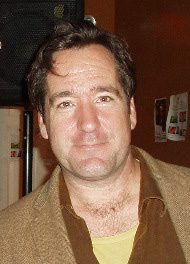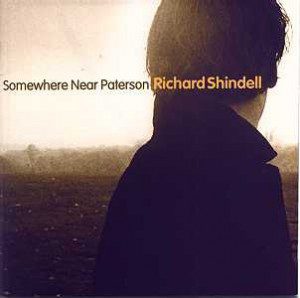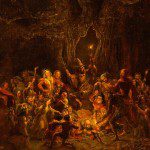 The turn of the seasons often dictates my musical choices. The summer is for classic rock and feel good pop, reggae, and ska. Winter puts me in the mood for heavy metal (much to my wife’s chagrin) and in the Spring I find myself longing for 80’s pop and bands like XTC. Autumn always finds me in the mood for folk artists with Pagan overtones and oftentimes some Irish fiddle. The rules aren’t hard and fast (I listen to everything year round), but certain seasons find me listening to particular artists more than others. Just the other day on the drive home from a pumpkin shopping expedition in Half Moon Bay CA my wife and I celebrated a glorious afternoon together by rolling down the windows and singing along loudly to Dave Carter, Dar Williams, Kate Rusby, and Richard Shindell.
The turn of the seasons often dictates my musical choices. The summer is for classic rock and feel good pop, reggae, and ska. Winter puts me in the mood for heavy metal (much to my wife’s chagrin) and in the Spring I find myself longing for 80’s pop and bands like XTC. Autumn always finds me in the mood for folk artists with Pagan overtones and oftentimes some Irish fiddle. The rules aren’t hard and fast (I listen to everything year round), but certain seasons find me listening to particular artists more than others. Just the other day on the drive home from a pumpkin shopping expedition in Half Moon Bay CA my wife and I celebrated a glorious afternoon together by rolling down the windows and singing along loudly to Dave Carter, Dar Williams, Kate Rusby, and Richard Shindell.
I’m madly in love with all of those artists, but as I’ve grown older the one I appreciate the most is Richard Shindell. I first discovered Richard as part of Cry Cry Cry; a folk trio comprised of Shindell, Dar Williams, and Luck Kaplansky. Back in 1998 I was completely obsessed with Dar Williams (I’ll be writing about her in December, promise) and when Cry Cry Cry was released at my local record shop I was one of the first in line. Cry Cry Cry was a lot more “traditional” than Dar’s* solo output and it took me a while to warm up to it, but when I finally did two things were glaringly obvious: the best song on the record was a Richard Shindell composed tune, The Ballad of Mary Magdalene, and the best thing about the record was Richard Shindell.
 I’ve always had a soft-spot for spiritual travelers. I don’t need someone to believe exactly the same way I do to feel a kinship, I just need to know that their spirit is restless and ready to wrestle with the next big question. After stints at both a Zen Buddhist monastery and the Union Theological Seminary in New York City I’d say that Shindell qualifies as a traveler. That journey has taken him into Pagan waters as well, along with that gray area where Paganism crashes up against the shore of Christianity.
I’ve always had a soft-spot for spiritual travelers. I don’t need someone to believe exactly the same way I do to feel a kinship, I just need to know that their spirit is restless and ready to wrestle with the next big question. After stints at both a Zen Buddhist monastery and the Union Theological Seminary in New York City I’d say that Shindell qualifies as a traveler. That journey has taken him into Pagan waters as well, along with that gray area where Paganism crashes up against the shore of Christianity.
Conversion from one faith to another is seldom accomplished in a span of days or even weeks. New ideas collide with old ones, and traditions are adapted, discarded, and sometimes even created upon the rocks of change and transformation. Few artists are capable of capturing this moment of awakening and discovery openly and honestly; Shindell is one who can. Instead of turning away from the Virgin Mary, Shindell makes her a knowing accomplice in the conversion from Christian to Witch (or possibly Witch to Christian and back to Witch again) in On A Sea of Fleur-De-Lis:
I adore thee Mother Mary
But would you change me back to a witch?
As a witch would I love you more than any man
So give a wink, give a nod, but give a damn
Be a sport, Mary, and don’t tell Dad
He need never know how He’s been had
And never you mind about those seven seals
Daddy was a one shot deal
Of course all of that is just my own interpretation and Shindell has stated that he’s pretty much just a listener when it comes to this particular song.
The best folk singers are usually the best storytellers, and few artists write better from someone else’s point of view that Shindell. His Ballad of Mary Magdalene is a poignant tale told from Mary’s point of view that both humanizes Jesus and scolds the Christian Church for its issues with intimacy. This is the Jesus and Mary found in books like The Moon Beneath Her Feet and The Goddess in the Gospels. For me, it was the perfect song at just the perfect time to help me deal with my own issues as I moved from Christianity to Paganism.
A love like this will come but once
This I do believe
And Ill not see his like again
As I live and breath
And Im sorry if I might offend
But I will never see
How the tenderness I shared with him
Became a heresy
While my favorite Shindell songs all have religious overtones they make up only a small percentage of his catalog. Like many folk-artists a lot of his songs deal with the day to day struggles of ordinary people. Whether it’s the young Argentinian stowaway in his Che Guevara T-shirt or the guy changing his life’s direction by climbing into the Kenworth of My Dreams (that’s a title and a semi-truck) Shindell is a man of many skins. There’s also that ear for melody and harmony that’s made My Love Will Follow You (a Buddy Miller and Julie Miller tune with harmony vocals by Dar and Kaplansky) a favorite of the wife and I. I also don’t think I’ve ever heard post-breakup bitterness better expressed than in Are You Happy Now?; my favorite Halloween break-up lament. Humor and rancor have never been better buddies.
It’s the spiritual stuff that always brings me back to Shindell, and when he’s on his game he has a way of turning the small moments into big events. Spring from 2000’s Somewhere Near Patterson is Shindell in full command of his craft. The power of Spring and the turn of the Wheel is turned into a glorious reflection on the Earth’s yearly changes and ends with a reel that you won’t want to end once you hear it. Autumn might put me in the mood for folk music, but Shindell sets the table for the warmer months too: “Winter’s just the curtain, Spring will take the bow.”
Calling the Moon is a Dar Williams’s classic, but I find Shindell’s cover of the song especially powerful. He strips it down to just a guitar and a vocal, essentially personalizing the song to such a degree that listening to it makes me feel like I’m eavesdropping on someone. Just beautiful, the perfect thing to play on a quiet night when I’m alone and pondering my place in the larger scheme of things.
If this article piqued your interest in Shindell I recommend starting with the tracks written about here (along with So Says the Whippoorwill and Wisteria.) My favorite Shindell album is Somewhere Near Patterson (Spring, Calling the Moon), but I’m a fan of everything he’s put out (and the live stuff is just as good as the studio recordings, especially Courier from 2002). He currently lives with his wife and children in Argentina, so he doesn’t tour the States all that much anymore, but when he does tickets are cheap and it’ll be a performance you’ll never forget.
*Much like Tori Amos is simply “Tori,” at our house Dar Williams is just “Dar.” I’ll be putting together a Pagan Folkways: Dar Williams piece in December.

















